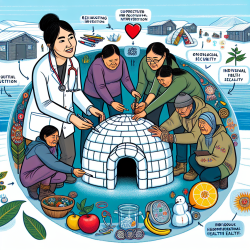The study titled “We’re Home Now”: How a Rehousing Intervention Shapes the Mental Well-Being of Inuit Adults in Nunavut, Canada provides crucial insights into how housing interventions can significantly affect mental health. With a focus on the Inuit community in Nunavut, this research highlights the transformative power of secure housing and its implications for practitioners working with Indigenous populations.
Key Findings from the Research
- Refuge Creation: The provision of stable housing allowed participants to create a safe space where they could express themselves freely and feel secure.
- Self-Determination and Control: Having control over their living environment empowered individuals to make decisions that positively influenced their lives and relationships.
- Improved Family Dynamics: Rehousing facilitated better family interactions and contributed to identity repair, aligning with the Inuit's holistic view of well-being.
Implications for Practitioners
The findings underscore the importance of considering cultural perspectives when implementing housing interventions. Practitioners can enhance their skills by integrating these insights into their work:
- Cultural Sensitivity: Understanding the unique cultural context of Inuit communities is essential. Practitioners should be aware of traditional values and practices that influence mental well-being.
- Holistic Approach: Addressing not only physical but also emotional, social, and spiritual aspects of well-being can lead to more effective interventions.
- Advocacy for Housing Solutions: Supporting initiatives that increase access to safe and culturally appropriate housing can have a profound impact on community health.
Encouraging Further Research
This study opens avenues for further exploration into the relationship between housing and mental health among Indigenous populations. Practitioners are encouraged to engage in research that considers:
- The long-term effects of rehousing on community well-being.
- The role of traditional practices in enhancing mental health outcomes.
- The impact of policy changes on housing availability and quality.
By deepening our understanding of these areas, practitioners can contribute to more effective strategies that promote health equity for Indigenous peoples.
Conclusion
The research on rehousing interventions among Inuit adults in Nunavut highlights the critical role that secure housing plays in fostering mental well-being. Practitioners can improve their skills by incorporating these findings into their practice, advocating for culturally sensitive solutions, and participating in further research. Such efforts will not only enhance individual outcomes but also support broader community health initiatives.
To read the original research paper, please follow this link: “We’re Home Now”: How a Rehousing Intervention Shapes the Mental Well-Being of Inuit Adults in Nunavut, Canada.










